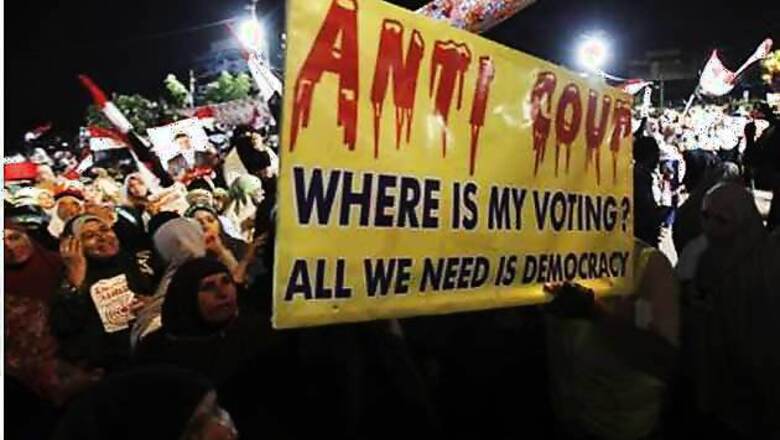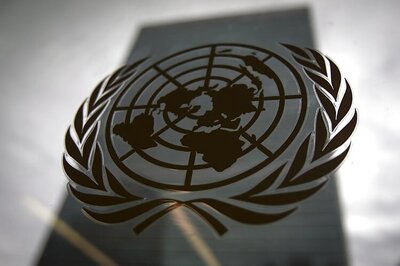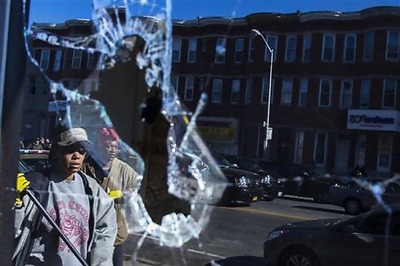
views
Thousands of supporters of deposed President Mohamed Morsi took to the streets of Egyptian cities on Friday to demand the reinstatement of the Islamist leader.
However, Egypt's armed forces, which shunted the country's first freely elected president from office less than three weeks ago, looked in no mood to make concessions, putting on a show of force in the hazy skies above Cairo.
Eight fighter jets screamed over the sun-baked city both in the morning and afternoon, while two formations of helicopters, some trailing the Egyptian flag, hummed over the roof tops.
Waving their own Egyptian flags, along with portraits of the bearded Morsi, members of the Muslim Brotherhood marched in Cairo, Alexandria and several other cities along the Nile Delta, denouncing what they termed a military coup.
"We are coming out today to restore legitimacy," said Tarek Yassin, 40, who had travelled to Cairo from the southern city of Sohag, underscoring the Brotherhood's deep roots in the provinces. "We consider what happened secular thuggery. It would never happen in any democratic country," he said.
Soldiers prevented protesters from nearing army installations, and there were reports of only minor scuffles, with troops firing tear gas to disperse demonstrators close to the presidential palace in Cairo, the state news agency said.
"We are following the progress of the protests and are ready for all events or escalation," said a military official, asking not to be named as he was not authorised to talk to the media.
At least 99 people have died in violence since Morsi's removal on July 3, more than half of them when troops fired on Islamist protesters outside a Cairo barracks on July 8. Seven people died earlier this week in clashes between opposing camps.
"They (the Brotherhood) now know the people are not with them and have had it with them after what happened to them and their country this past year," the officer said.
The army has dismissed any talk of a coup, saying it had to intervene after vast protests on June 30 against Morsi, denounced by his many critics as incompetent and partisan after just a year in office.
It has called for a new constitution and a swift new vote, installing an interim cabinet that includes no members of the Brotherhood or other Islamist parties that triumphed in a string of elections following the fall of Hosni Mubarak in 2011.
Morsi is being held in an undisclosed location by the army, and numerous senior Muslim Brotherhood leaders have also been detained in recent days, leading to fears of a broad crackdown.
The top United Nations human rights official, Navi Pillay, has asked the new Egyptian government to explain both the legal basis for the detentions and to say whether trials were planned.
"We've specifically asked about (Morsi) and his presidential team in addition to others who were arrested. We don't even know how many people at this point," Pillay's spokesman, Rupert Colville, told reporters in Geneva on Friday.
Morsi backers have set up a round-the-clock vigil outside a mosque in the Cairo suburb of Nasr City. Thousands flocked there on Friday to join the protests, but the fierce summer heat, coming at a time when devout Muslims fast to mark the holy month of Ramzan, might have kept some supporters away.
"Tonight, tonight, tonight, Sisi is going down tonight," the crowd chanted, referring to General Abdel-Fattah al-Sisi, the head of the armed forces, who played a central role in driving Morsi from office.
Large-scale anti-Morsi demonstrations, called by the Tamarud youth movement, which organised the decisive June 30 protests, failed to materialise on Friday.
In his first address as interim president, Adli Mansour, previously head of the constitutional court, promised on Thursday to fight those he said wanted to destabilise the state.
"We are going through a critical stage and some want us to move towards chaos, and we want to move towards stability. Some want a bloody path," he said in a televised address. "We will fight a battle for security until the end."
Egypt, the most populous nation in the Arab world, is a strategic hinge between the Middle East and North Africa and has long been a vital US ally in the region.
Washington has tried to tread softly through the crisis, undecided whether to brand the downfall of Morsi a coup, a move that would force the United States to suspend all aid to Cairo, including some $1.3 billion given annually to the military.
US Secretary of State John Kerry telephoned Egypt's new foreign minister, Nabil Fahmy, expressing hopes that the transitional period of government would be successful, a spokesman for the Egyptian foreign ministry said on Friday.
Muslim Brotherhood leaders say they will not resort to violence in their campaign to reinstate Morsi.
"The goal of our peaceful mass rallies and peaceful sit-ins in squares across Egypt is to force the coup plotters to reverse their action," Essam el-Erian, a senior Brotherhood official, said on his Facebook page.




















Comments
0 comment